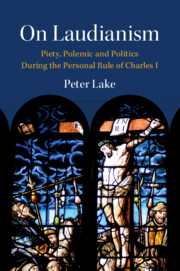Book contents
- On Laudianism
- Cambridge Studies in Early Modern British History
- On Laudianism
- Copyright page
- Contents
- Acknowledgements
- Abbreviations
- Introduction
- Part I Laudianism: Where It Came From
- Part II Laudianism: What It Was
- Part III Laudianism: What It Wasn’t
- Chapter 20 Order, Puritanism and the State of the English Church
- Chapter 21 Puritan ‘Privacy’, or the Forms of Puritan Voluntary Religion Anatomised
- Chapter 22 A Religion of the Word and the Question of Authority
- Chapter 23 Puritanism, Popularity and Politics
- Chapter 24 Of Moderate Puritans and Popular Prelates
- Chapter 25 The Puritan Threat, the Church of England and the Personal Rule as a Period of Reformation
- Part IV Laudianism and Predestination
- Part V Laudianism as Coalition: The Constituent Parts
- Conclusion
- Index
Chapter 23 - Puritanism, Popularity and Politics
from Part III - Laudianism: What It Wasn’t
Published online by Cambridge University Press: 05 October 2023
- On Laudianism
- Cambridge Studies in Early Modern British History
- On Laudianism
- Copyright page
- Contents
- Acknowledgements
- Abbreviations
- Introduction
- Part I Laudianism: Where It Came From
- Part II Laudianism: What It Was
- Part III Laudianism: What It Wasn’t
- Chapter 20 Order, Puritanism and the State of the English Church
- Chapter 21 Puritan ‘Privacy’, or the Forms of Puritan Voluntary Religion Anatomised
- Chapter 22 A Religion of the Word and the Question of Authority
- Chapter 23 Puritanism, Popularity and Politics
- Chapter 24 Of Moderate Puritans and Popular Prelates
- Chapter 25 The Puritan Threat, the Church of England and the Personal Rule as a Period of Reformation
- Part IV Laudianism and Predestination
- Part V Laudianism as Coalition: The Constituent Parts
- Conclusion
- Index
Summary
The chapter analyses the Laudian critique of puritanism as politically subversive of both monarchical and episcopal authority. Puritanism was portrayed by the Laudians as an ideology organised around ‘popularity’. This word denoted two things: firstly, the search for popular approval and applause, to be gained by a rabble-rousing espousal of singularity and an unprincipled criticism of those in power in church and state, and secondly, institutional arrangements – in the church, presbyterianism, and, in the state, an enhanced role for parliament – that subjected the rulers to the whims and opinions of the people. The organising trope was the puritan as a firebrand or incendiary, or alternatively as a malcontent tribuni plebis, with frequent either glancing or direct references being made to the so-called puritan triumvirs, Burton, Bastwick and Prynne.
- Type
- Chapter
- Information
- On LaudianismPiety, Polemic and Politics During the Personal Rule of Charles I, pp. 308 - 316Publisher: Cambridge University PressPrint publication year: 2023

